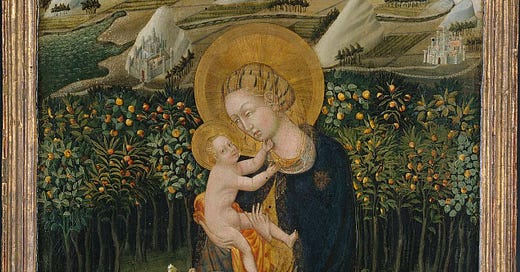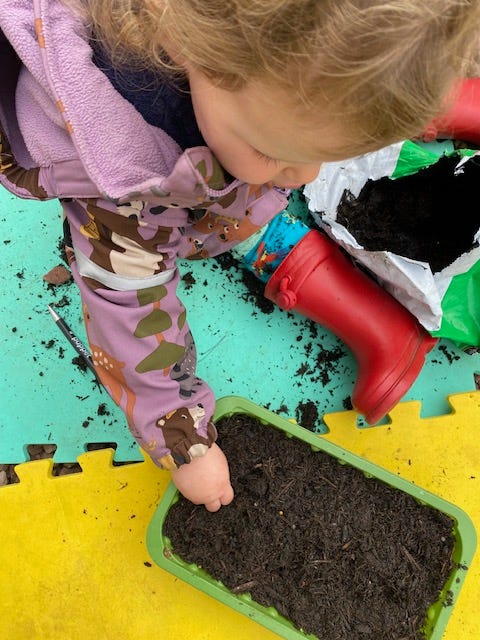I have been thinking about community, and the non-human world, and Mary mother of Jesus, and change, and new life.
Once, lying on the grass in a local park, I heard a faint humming that grew, and grew, until it was a loud buzzing passing over my head. And then voices: “Bees! Bees! Follow the bees!”. I stood up and saw a man and woman running towards me with a net. I looked up and saw a huge swarm of bees passing overhead. Being closer than the man and woman, I followed the bees. I did not know why, only that it seemed urgent I did. Eventually, the man and woman caught up and somehow netted the swarm. “The queen broke away” they explained, telling me that they were beekeepers. “But she went AWOL. We thought we’d lose them. We’re going to take them to their new hive”.
I have learned that when a bee colony is too big, the queen will break away with some of the bees and start a new hive, the group’s survival depending on an ongoing balance of disruption and new growth.
In The Mushroom at the End of the World, Anna Lowenhaupt Tsing says “We forget that collaborative survival requires cross-species coordinations. To enlarge what is possible we need other kinds of stories.” She goes on to say that “the knowledge that makes a difference in changing the world is knowledge that travels and mobilises, shifting and creating new forces and agents of history in its path.”
This winter, we have seen glimpses of starling murmurations: masses of individuals that are both structured and fluid, defined by movement which is defined by mutual awareness. The starlings’ dance is a tension between continuity and change, just like the bees, and just like the coral reefs I have seen off the coast of Belize; an ecology that is dependent on the accumulation of tiny individuals that form colonies and over time, entire ecosystems. New organisms like fish and seaweed help the reef to thrive. But if key species disappear, or if conditions change drastically, the reef breaks down.
Like the reefs, our human and beyond-human ecosystems are dependent on layers of contribution, and on the right balance of new and old. They are dependent on movement, on arrival, on departure. These ecosystems are both resilient and porous, dependent on change and on continuous care. I think it is easy to forget this. To think that we build our life or our community toward something, and then at some point we finally arrive. But things just keep changing. I admire the coral reefs, the starlings, the bees, who know that change will come, and that they need it to come — and that though change can be disruptive and destructive, it is also life-expanding. At the moment, I am actively seeking change in my own life, but I am also curious about the roots that anchor me; about my own balance of disruption and continuity.
Alongside swirling swarming dancing creatures, Mary's ‘Magnificat’ (which means ‘my soul magnifies the Lord’) has been in my soul lately. Mary, mother of Jesus, speaks words that were revolutionary at the time, and have lost nothing of their political, social and economic power now. An extract:
…He [God] has scattered the proud in their conceit.
He has cast down the mighty from their thrones,
and has lifted up the humble.
He has filled the hungry with good things,
and the rich He has sent away empty…
She said these words before she gave birth to Jesus. God — who I imagine could have just appeared on the Earth in a puff of spirit — chose instead to inhabit and be born from a woman who cared for the poor, the humble, the hungry. He chose to be cared for and be taught by a woman who railed against the proud, the mighty, the rich. This is my favourite Jesus, my favourite Mary. In the painting at the top of this post, she is still in her traditional adoring and tender pose surrounded not as we often see with buildings and angels and men, but by the natural world which cares for her and holds her, and her son, and all of us up.
She is tender, but not only tender. The German pastor, theologian, and anti-Nazi dissident Dietrich Bonhoeffer said in an advent address that: “The song of Mary is the oldest Advent hymn. It is at once the most passionate, the wildest, one might even say the most revolutionary Advent hymn ever sung. This is not the gentle, tender, dreamy Mary whom we sometimes see in paintings…”
Under British rule, the Magnificat was banned from being sung or read in India. In 1980’s Guatemala, the government deemed Mary’s declaration that God is concerned for the poor to be so dangerous that it banned any public display of her words. The military junta of Argentina did the same.
Today, in this world of beauty and abundance and health and dignity and freedom and peace, so many people cannot access these things. We still need Mary’s song: the poor are still blamed for their own poverty, disabled people still face loss of dignity and life, the homeless are still demonised for needing shelter, food and rest, and the poorest and most vulnerable in the world are losing support they relied on because of cruelty and hatred, to fatal effect. But I know that care and justice and mercy could change all of this, and that these are qualities that we could draw on if we, like the starlings, could be mutually aware and responsive; if we, like the bees, could pursue health for the entire colony; if we, like the coral reefs, could recognise that layers of life from beings like us and not like us help the whole system to thrive.
Lately, as I think about my own change, and when I read the news and feel powerless and even hopeless — a feeling I am not used to feeling — I turn to Mary and to coral reefs and bees and starlings and beyond — to “other kinds of stories” that Anna Lowenhaupt Tsing speaks of. There is action and hope to be found in revolutionary mothers of old and of now, and by the quietly revolutionary creatures of the Earth, who all sing their song in the way they know how. This is what I hear:
Creating new things can save the world, and the world’s old creation will save new things.
Care will birth change, and change can be a kind of care.
Ecologies depend on individuals, and individuals depend on ecologies.
Resilience and porosity to change is a finely balanced dance.
Movement can be difficult, and difficulty can move us, change us.
To enlarge what is possible, what is possible must be dreamed and lived.
Tender things can be true, and truth can also rail and rage, and all of these ways of being will birth a new world.
All easier written than lived, I know. But still, in the beginning, we are told, was the word.
In my last post, I mentioned that I’d share a bit about my writing journey so far, as I’d had a few questions.
So as not to clutter the eyes and minds of readers who aren’t interested in the book and writing stuff, I’ve created a separate post which I’ve published but not emailed. If you’re interested, you can read it here:
A few good things:
The new UK GCSE in natural history (created after years of work by tireless campaigners)
My husband produces a podcast hosted by farmer and former MP Neil Parish. It’s called ‘We Can Do Both’, and in each episode, Neil meets someone involved in providing food AND restoring nature. The latest episode features James Robinson, a dairy farmer in Cumbria (who is also a writer and part of my writing community from the Rural Writing Institute). You can listen here or wherever you get your podcasts.
Knowing that new life will emerge even when all you do is push a tiny seed into the dark (doing so here with my helper):
Thank you for being here.
Love,
Elizabeth
If you’d like to support my work, please consider clicking the ‘like’ button, leaving a comment, sharing, subscribing, or becoming a paid subscriber. It all helps. Thank you if you do any of these things already 🙏







Your words weave a wonderful tapestry of images and ideas. I love the painting. Early Renaissance art conveys a luminous spirituality. I didn’t know about Mary’s words being banned. That says a lot. The human race is having to learn equality the hard way. Bees and starlings know all about moving together in harmony with the earth and each other.
What an inspiring, thoughtful piece, Elizabeth. And yes, ‘the word’ can begin so much; in this I hope and trust.